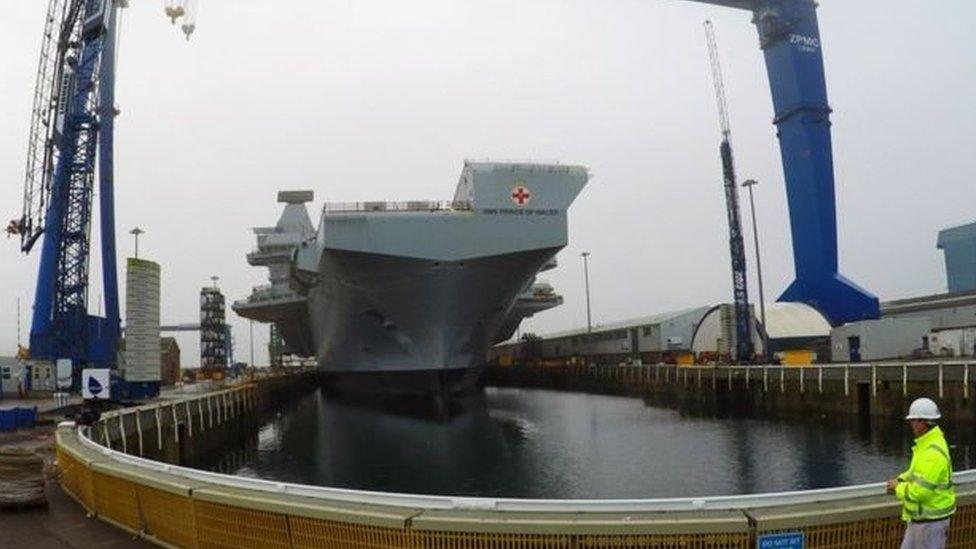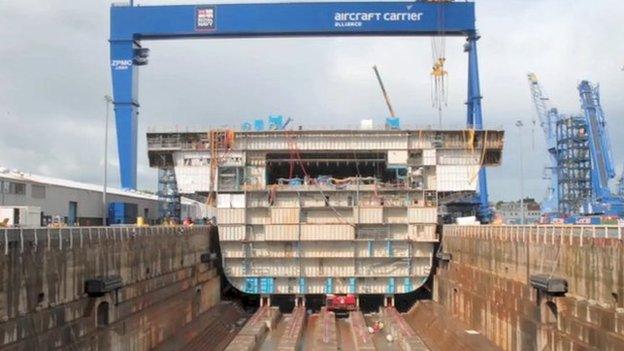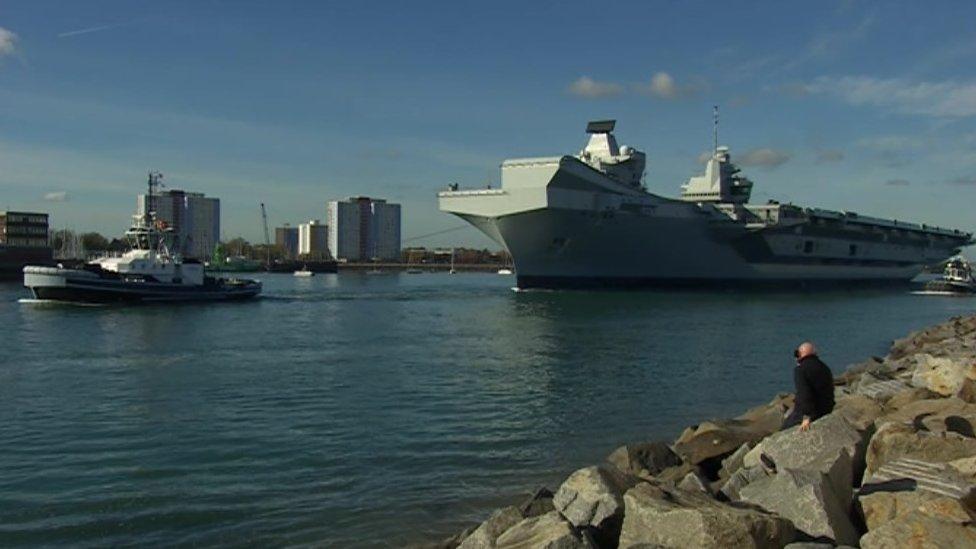Babcock announces 150 more job losses at Rosyth
- Published
- comments

The aircraft carriers were constructed across seven sites before being assembled at Rosyth
Another 150 jobs are to be lost at the Babcock shipyard in Rosyth, the company has confirmed.
The yard is currently working on the second of two aircraft carriers for the Royal Navy.
In November 2017, the yard announced 250 redundancies, followed by a further loss of 150 jobs in March last year.
A Babcock spokesman said it "anticipated the loss of about 150 specific roles".
He said it followed an assessment of the company's current workload and medium-term opportunities and said the roles were no longer needed in line with the rundown of the aircraft carrier programme.
'Kick in the teeth'
The Unite union said the news was a "kick in the teeth" for the Scottish economy and a "world-class workforce that had worked tirelessly to build the UK's two new aircraft carriers".
Steve Turner, the union's assistant general secretary for manufacturing, said: "The men and women whose skills built the UK's two new world-leading aircraft carriers at Rosyth are at risk of being lost for a generation in a blow to the Scottish economy and UK shipbuilding.
"Today's announcement of job losses will send shudders down the spine of shipyard workers across the UK who in recent months have endured the threat of redundancy on the Mersey and the closure of Devon's Appledore shipyard."

Aircraft carrier HMS Queen Elizabeth, leaving the Firth of Forth
He warned that the job losses at Rosyth could "turn into a flood" leaving the industry with a "yawning skills gap" unless the UK government started delivering on a shipbuilding strategy that guaranteed the Royal Navy's new auxiliary ships were block built in UK shipyards using British steel.
He also called for the government to bring forward work on the Type 31e frigate for export around the globe.
'New challenges'
GMB Scotland said Rosyth needed large-scale shipbuilding to realise its full potential.
The union's Scottish organiser Gary Cook said: "These redundancies stress the urgent need for the UK government to ensure the three Royal Fleet Auxiliary (RFA) vessels are built in British shipyards, including Rosyth."
A spokesman for Babcock said the prospects for the company's operations at Rosyth "remain strong with great opportunities".
"Last year we began the process to reshape our business in order to remain competitive and take on new challenges, as the large-scale design and build phase of the Queen Elizabeth carrier programme reaches completion," he said.
He added: "Our employees remain our priority throughout this process; we understand how unsettling this can be and will work closely with those affected and our trade union representatives through this consultation period to redeploy or relocate as many employees as possible within our wider organisation and support those who may wish to take this opportunity to move on."
Unite plans to seek an urgent meeting with the Scottish government to put pressure on the UK government over future contracts.
Business Minister Jamie Hepburn said the Scottish government would support those facing redundancy following the "extremely disappointing news".
'Safeguard jobs'
"Scottish Enterprise, the Scottish government's enterprise agency, is working to support the company as they diversify into other areas of business," he added.
"We welcome the company's commitment to seek to redeploy or relocate as many individuals as possible, helping to safeguard jobs."
A spokesperson for the Ministry of Defence said: "We continue to invest in British shipbuilding, as demonstrated by our Type 26 and Type 31e programmes.
"Babcock's Rosyth yard has played a key role in our Queen Elizabeth Class carrier programme and just last month was awarded a £5m contract to carry out maintenance on HMS Queen Elizabeth later this year."
The £6.2bn Queen Elizabeth Class (QEC) aircraft carrier programme saw the construction of the HMS Queen Elizabeth and HMS Prince of Wales across seven sites, before final works at Rosyth. They are the largest warships to be built for the Royal Navy.
HMS Queen Elizabeth has already undergone sea trials while HMS Prince of Wales is due to begin trials later this year.
- Published13 March 2018

- Published28 November 2017

- Published16 August 2017

- Published30 October 2017
